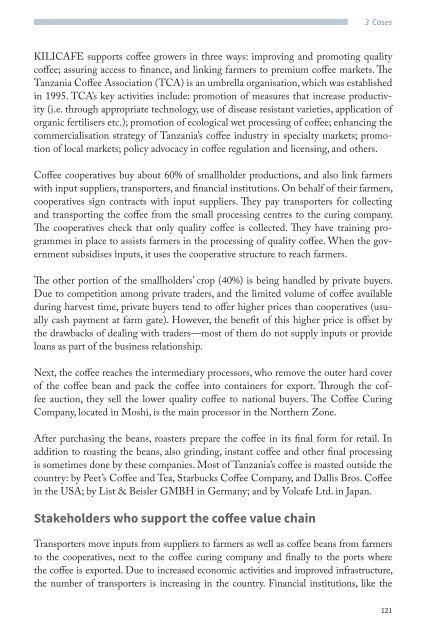Regional Markets
56ec00c44c641_local-markets-book_complete_LR
56ec00c44c641_local-markets-book_complete_LR
Create successful ePaper yourself
Turn your PDF publications into a flip-book with our unique Google optimized e-Paper software.
3 Cases<br />
KILICAFE supports coffee growers in three ways: improving and promoting quality<br />
coffee; assuring access to finance, and linking farmers to premium coffee markets. The<br />
Tanzania Coffee Association (TCA) is an umbrella organisation, which was established<br />
in 1995. TCA’s key activities include: promotion of measures that increase productivity<br />
(i.e. through appropriate technology, use of disease resistant varieties, application of<br />
organic fertilisers etc.); promotion of ecological wet processing of coffee; enhancing the<br />
commercialisation strategy of Tanzania’s coffee industry in specialty markets; promotion<br />
of local markets; policy advocacy in coffee regulation and licensing, and others.<br />
Coffee cooperatives buy about 60% of smallholder productions, and also link farmers<br />
with input suppliers, transporters, and financial institutions. On behalf of their farmers,<br />
cooperatives sign contracts with input suppliers. They pay transporters for collecting<br />
and transporting the coffee from the small processing centres to the curing company.<br />
The cooperatives check that only quality coffee is collected. They have training programmes<br />
in place to assists farmers in the processing of quality coffee. When the government<br />
subsidises inputs, it uses the cooperative structure to reach farmers.<br />
The other portion of the smallholders’ crop (40%) is being handled by private buyers.<br />
Due to competition among private traders, and the limited volume of coffee available<br />
during harvest time, private buyers tend to offer higher prices than cooperatives (usually<br />
cash payment at farm gate). However, the benefit of this higher price is offset by<br />
the drawbacks of dealing with traders—most of them do not supply inputs or provide<br />
loans as part of the business relationship.<br />
Next, the coffee reaches the intermediary processors, who remove the outer hard cover<br />
of the coffee bean and pack the coffee into containers for export. Through the coffee<br />
auction, they sell the lower quality coffee to national buyers. The Coffee Curing<br />
Company, located in Moshi, is the main processor in the Northern Zone.<br />
After purchasing the beans, roasters prepare the coffee in its final form for retail. In<br />
addition to roasting the beans, also grinding, instant coffee and other final processing<br />
is sometimes done by these companies. Most of Tanzania’s coffee is roasted outside the<br />
country: by Peet’s Coffee and Tea, Starbucks Coffee Company, and Dallis Bros. Coffee<br />
in the USA; by List & Beisler GMBH in Germany; and by Volcafe Ltd. in Japan.<br />
Stakeholders who support the coffee value chain<br />
Transporters move inputs from suppliers to farmers as well as coffee beans from farmers<br />
to the cooperatives, next to the coffee curing company and finally to the ports where<br />
the coffee is exported. Due to increased economic activities and improved infrastructure,<br />
the number of transporters is increasing in the country. Financial institutions, like the<br />
121


